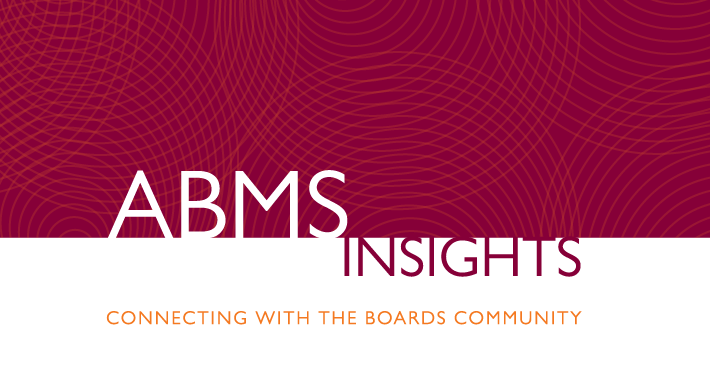
Many American Board of Medical Specialties (ABMS) Member Boards are using longitudinal assessment to reframe the role of assessment in their continuing certification programs. Simply put, longitudinal assessment is designed not only to assess physician knowledge, but also to identify knowledge gaps and support learning and improvement. “It draws on principles of adult learning and modern technology in order to promote learning and retention,” stated David Swanson, PhD, ABMS’ Vice President of Academic Programs and Services. Hear more from Dr. Swanson about longitudinal assessment.
Longitudinal assessment involves:
- Shorter assessments of specific content related to a physician’s needs and interests
- Recurring assessments over a period of time to reinforce concepts and promote learning and retention
- Ongoing performance feedback to identify areas in which additional learning is desirable
- Follow-up assessments to ensure that knowledge gaps are addressed
The recurring testing that occurs in longitudinal assessment has been shown to result in better long-term retention than repeatedly studying the same material. Medical students have caught on to this method of studying, employing a variety of ways to self-assess whenever they have a spare moment. Now board certified physicians can take advantage of this innovative approach that pairs assessment with opportunities for learning. These emerging programs introduce formative elementsthat guide physician learning as well as assessment data to help Member Boards reach a summative decision.
Questions used in longitudinal assessment may address core specialty and/or practice-specific content, and due to its administration in real time, can also include emerging medical knowledge and urgent public health topics. Content may be drawn from new practice guidelines, peer-reviewed articles, advances in the specialty, and critical public health information. Because longitudinal assessments are accessible on a desktop and tablet, physicians can choose when, where, and how they answer questions. This approach may reduce or eliminate the need for study courses or travel to exam centers, both of which take time away from practice. This ease and convenience are a welcome bonus.
Taking a deeper dive, this is how the American Board of Physical Medicine and Rehabilitation’s (ABPMR’s) longitudinal assessment works: A board-certified physiatrist logs in from their desktop or downloads an app. First, the physician customizes their assessment by choosing the percentage of questions they want to answer from each of five major physical medicine and rehabilitation content areas. Each quarter during the year, ABPMR sends 13 new multiple-choice questions plus two to five “clone” questions (i.e., questions with the same learning objective that differ in clinically superficial ways); the exact number of clone questions sent depends on the physiatrist’s performance in previous quarters. The physician has two minutes to answer each question, and all questions can be answered in one sitting or spread out across the quarter. After viewing a question and submitting an answer, the physiatrist receives immediate feedback about whether their answer is right or wrong, and an explanation for why the answer is correct and the other options are incorrect. If the physician’s first attempt is incorrect, they can read the feedback and take another attempt to answer the question in order to reinforce what they just learned. The physiatrist can track their progress and performance using an online dashboard, which also can be used to identify knowledge gaps and make plans to improve. In Year 5, ABPMR will make a summative decision based on the physiatrist’s performance in the previous four years, not including the four lowest-performing quarters. Then, the cycle begins again. Learn more about how ABPMR and six other Member Boards are using CertLink®, an innovative technology platform to deliver online longitudinal assessments.
Many Member Boards have been exploring longitudinal assessment approaches for the past few years. After extensive pilot testing, some ABMS Member Boards have transitioned from their traditional examinations to longitudinal assessment options with more Boards to follow. Learn more about Member Boards advancing their longitudinal assessment approaches.
© 2019, American Board of Medical Specialties.
